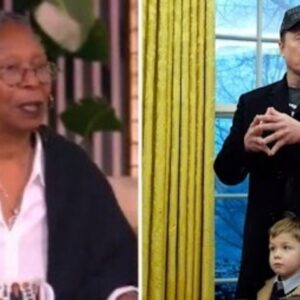The View: Whoopi Growls in Frustration at Trump’s Hollywood Tariff Threat: ‘Could You Please Lower the Price of Eggs’ First?

In a recent episode of “The View,” Whoopi Goldberg did not hold back her frustration regarding President Trump’s proposed 100% tariff on films produced outside the United States. During the lively discussion, the show’s hosts examined comments made by Jon Voight, who is serving as Trump’s envoy to Hollywood. Voight suggested the idea of introducing federal incentives aimed at boosting American film productions. However, the implications of such tariffs sparked a deeper conversation about their potential consequences on creativity and artistic expression.
The Complexity of Tariffs in Filmmaking

Goldberg voiced her deep-seated concerns that the proposed tariffs could severely hamper creative freedom for filmmakers. She raised an essential question about the practicality of implementing these tariffs, especially in relation to international productions. “We don’t import our folks to go over there,” she stated, indicating the intricacies involved in filmmaking across different locales. The prospect of applying tariffs on films that are deeply intertwined with foreign cultures and landscapes poses logistical challenges that could not be easily navigated.
Additionally, Goldberg highlighted that many successful films are made possible because of their international settings. This aspect is crucial not only for storytelling but also for the diverse representation that enriches the film industry. Tariffs could put unnecessary hurdles in front of creatives aiming to explore stories that are best told in their original cultural contexts, limiting their ability to produce authentic and diverse content.
Cost of Living and Economic Challenges

Amid her detailed analysis, Goldberg interjected with a humorous yet pointed remark about the rising costs of living, specifically referencing the price of eggs. Her commentary resonated with the audience, emphasizing that before the administration considers implementing hefty tariffs on the film industry, they should first address the escalating costs of everyday items that directly impact American families. The juxtaposition of discussing tariffs on creative content while everyday citizens struggle with basic expenses underscored the disconnect between governing bodies and the realities faced by the general populace.
Other hosts joined in on the conversation, with Sunny Hostin suggesting that Trump’s understanding of Hollywood and the complexities of the film industry seemed limited. Alyssa Farah Griffin chimed in with comedic scenarios, imagining the absurd results if some of Hollywood’s biggest shows were restricted to domestic settings only. This lighthearted banter highlighted a serious issue—if such tariffs were to be enacted, the resulting limitations could reshape the landscape of entertainment significantly.
Advocating for Creative Solutions

Goldberg firmly concluded that if genuine progress is desired within the film industry, the focus should shift towards removing barriers for filming in the U.S. rather than imposing tariffs that are likely to stifle creativity and productive capabilities. Advocating for tax incentives, she suggested a more effective strategy for encouraging domestic filming and supporting American creatives in a cohesive, positive manner. This approach could promote a flourishing film industry without compromising the diversity of storytelling that international collaborations provide.

The ongoing discussion illustrates the broader implications and challenges that could arise from President Trump’s proposed tariffs. The impact on Hollywood’s creative landscape, coupled with economic realities faced by many, becomes a significant focal point that aspires for thoughtful consideration. In the end, the talk on “The View” serves as a reminder that the intersection of policy and creativity demands a careful balance to foster an environment where filmmakers can thrive.






